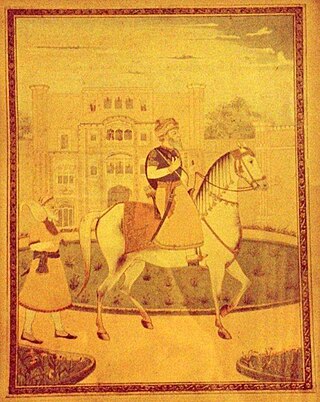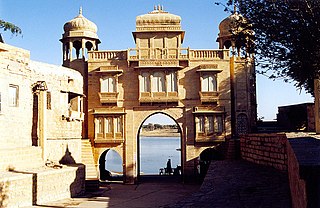
Nankana Sahib is a city and capital of Nankana Sahib District in the Punjab province of Pakistan. It is named after the first Guru of the Sikhs, Guru Nanak, who was born in the city and first began preaching here. Nankana Sahib is among the most important religious sites for the Sikh religion. It is located about 91 km (57 mi) west of Lahore and about 75 km (47 mi) east of Faisalabad. According to the census of 2017 the city has a population of 110,135 inhabitants. Until 2005, it was a part of the Sheikhupura District.
Bhutto is a Sindhi clan found in Sindh, Pakistan. The Bhuttos along with Bhattis and other subclans are said to linked to the Bhati Rajputs. They have been settled in Sindh for over two centuries, having migrated to the area from Jaisalmer in Rajasthan, India under Setho Khan Bhatti in the seventeenth century.According to other authors, the family migrated to Sindh from Sarsa in Hissar. The politically influential Bhutto family of Pakistan hails from this clan.

Batala is the eighth largest city in the state of Punjab, India in terms of population after Ludhiana, Amritsar, Jalandhar, Patiala, Bathinda, Mohali and Hoshiarpur. Batala ranks as the second-oldest city after Bathinda. It is a municipal corporation in Gurdaspur district in the Majha region of the state of Punjab. It is located from holy city Amritsar 39 km and about 32km from Gurdaspur, the headquarters of the district. It is also a Police district. Batala holds the status of the most populated town of the district with 31% of the district's total population. It is the biggest industrial town in the district.

Bhati is a Rajput clan that claims descent from a 3rd-century monarch, named Rao Bhati. The Bhati clan historically ruled over several cities in present-day India and Pakistan with their final capital and kingdom being Jaisalmer, India.

Jaisal Singh (1113–1168) was the founder and first ruler of the Kingdom of Jaisalmer, ruling from 1156 to 1168 CE. Singh was a Rajput chief of the Bhati clan who lived during the 12th century, Singh rose to power in 1143 by defeating his nephew, Rawal Bhojdeo of Lodhruva, in battle and seizing his nephew's position as Rawal. In 1156, Singh founded the city of Jaisalmer and became the Rawal of the Kingdom of Jaisalmer. Singh's descendants ruled Jaisalmer as Rawal, and later as Maharawal, until India's independence in 1947. Singh is also claimed to be the ancestor of the Phulkian dynasty and other notable families and individuals.

Jassa Singh Ahluwalia was a Sikh leader during the period of the Sikh Confederacy, being the supreme leader of the Dal Khalsa. He was also Misldar of the Ahluwalia Misl. This period was an interlude, lasting roughly from the time of the death of Banda Bahadur in 1716 to the founding of the Sikh Empire in 1801. He founded the Kapurthala State in 1772.

Rao Bhati was the progenitor ancestor of the Bhati clan of Rajputs.

The history of human settlement in the western Indian state of Rajasthan dates back to about 100,000 years ago. Around 5000 to 2000 BCE many regions of Rajasthan belonged as the site of the Indus Valley Civilization. Kalibangan is the main Indus site of Rajasthan, here fire altars have been discovered, similar to those found at Lothal.

Jaisalmer state is a region of Western Rajasthan state in western India. It lies in the southern part of Thar Desert.
Rai Bhoe Bhatti, alternatively spelt as Rai Bhoi Bhatti, was a Muslim Rajput zamindar in medieval India. He was the founder of a rebuilt Nankana Sahib, formerly known as Rai-Bhoi-Di-Talwandi, a village in the province of Punjab. He was born a Hindu but embraced Islam later on in his life. He was the son of Rai Raaney Bhatti.

Kapurthala State, was a kingdom and later Princely state of the Punjab Province of India. Ruled by Ahluwalia Sikh rulers, spread across 510 square miles (1,300 km2). According to the 1901 census the state had a population of 314,341 and contained two towns and 167 villages. In 1930, Kapurthala became part of the Punjab States Agency and acceded to the Union of India in 1947.

The Taoni is a Rajput ethnic group who, dominated a region in Ambala district then a part of the Punjab until the period of the British India. They are an offshoot of Bhati Rajputs of the Kingdom of Jaisalmer. The Taoni (Bhatis) also ruled over Punjab Hills being rulers of the Sirmur State until 1948. Before the Partition of India, In areas surrounding Rajpura and Patiala, the Taons or Taoni had 14 Chhats and 24 makans, the chhats – being Banur, Shamdo, Kauli, Ghanaur, Patton, Khera Gujju, Suhron, Ajrawar, Chamaru, Manakpur, Jausla, Kharar, Khanpur and Morinda. According to the tradition of the tribe, their eponymous ancestor Raja Tan was a grandson of Rawal Shalivahan Singh II, the King of Jaisalmer (1168–1200). The said Raja Tan left Jaisalmer and came to Jalandhar, Punjab. Later, His descendent Raja Amba founded the city of Ambala and made it the capital of his kingdom.

The Kingdom of Jaisalmer was a kingdom of Bhati Rajputs in the far-western part of present-day Rajasthan, India, from the mid-12th century CE until 1947. In 1156 CE, Rawal Jaisal moved his capital from Lodhruva to Jaisalmer because the former was vulnerable to attacks from Turko-Afghan and Baloch tribes. The descendants of Jaisal continued to exercise absolute control over Jaisalmer until 1818 CE, when a treaty of subsidiary alliance with the British East India Company bringing under British protection and sphere of influence. Known as the Maharawal, the native ruler of the princely state was entitled to a 15-gun salute.
Aujla Banwali is a village in Kapurthala district of Punjab State, India. It is located 5 km away from Kapurthala, which is both district and sub-district headquarters of Aujla Banwali village. The village is administered by sarpanch, an elected representative of the village.
Ahluwalia is an Indian caste native to the Punjab region.
Political marriages in India have occurred throughout history.
Sheikh Sadruddin was a chief of the jagir of Maler and an ancestor of the rulers of the Malerkotla State. He received the area of Maler as jagir from Bahlul Lodi after marrying his daughter Taj Murassa in 1454. He belonged to Sherwani tribe of Afghanistan.








